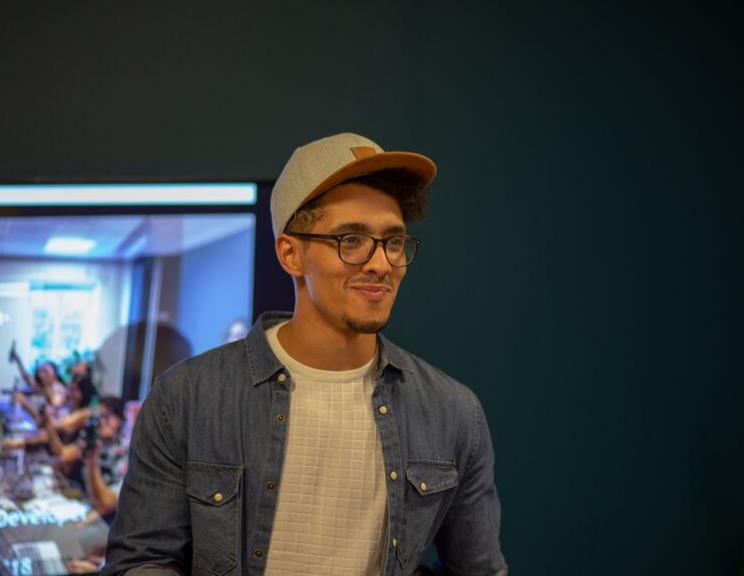SmartCoding (SC): Would you like to tell me a little bit about yourself?
Oussa (O): Thanks for having me, my name is Oussama Zaki, I’m a tech enthusiast with a passion for people. I’ve been a Software Engineer for the past five years, however, my journey with programming started a while back, about 10 years ago in 4 different countries. France, Morocco, the United States and Sweden.
I find meaning in life through Impact, and it’s unquestionable that nowadays, technology can help us provide a fast and positive impact.
SC: So you describe yourself as a patient person?
O: Well yes and no, for example, I hate queues. But learning is a whole different experience, the voyage is delightful, the joy of feeding your curiosity, getting your questions answered. I definitely can be patient for the Aha moments. Now, guiding a person through that learning journey, which is what teaching is supposed to be, is even better. Seeing your impact on people is a very emotional experience for me.
SC: How did you learn to code?
O: Well, after the classic hello world, I made a guessing game in C programming language. The program randomly picks a secret number, the user is then prompted to guess it, and you get hints if your input is larger or smaller than the correct answer. I had my dad as my first beta-tester, he was so proud of me, and that helped me a lot. We can fairly say that I started as a self-taught programmer before I went to uni for a Computer Science MSc.
SC: What do you like about programming?
O: The thing is that I enjoy creating, I love making things. And if you are making things that are useful for people, for your environment and surrounding, that’s some next-level luxury. It’s literally a super-power. It all ties down to impact. Positive impact!
SC: What does teaching mean to you?
O: Kids don’t learn from people they don’t like, the same goes for adults. Teaching is not only about facts passing and explaining complex concepts. In my opinion, education is more about inspiring individuals to go look for that knowledge and guide them through that learning journey.
SC: How did you encounter SmartCoding?
O: When I moved to Stockholm, in early 2016, I’ve been particularly interested in two problems, the tech education gap and the gender gap in tech. I was a Software Engineer at Klarna when a colleague mentioned the SmartCoding initiative. They organized a small evening meetup that I attended. I had a great conversation with the founders, I saw an excellent opportunity for making a significant impact, they felt my enthusiasm and my passion for tech and teaching. We decided to work together!
There is a bittersweet anecdote about our first planning session. We arranged a meeting in a cafe, downtown Stockholm. My backpack got stolen while I went to fetch my Coffee. Including my laptop on which I was supposed to present my proposal and several other personal belongings. We condemned it, we laughed about it, but we still managed to have a productive meeting.
SC: How does your work for SmartCoding look like?
O: I had a very diverse group of students in terms of experience. I had apprentices who’ve tried programming before, and others who were relatively new to the concept. The objective was to make it fit for everybody, which was proven to be very challenging.
Logical reasoning and basic mathematics can help us absorb programming concepts better and faster. But it’s the right mindset and the strong attitude that makes the difference. Attitude makes great!
I believe coding is for everyone. And I made a clear statement at the beginning of the course that we should not compare our progress to our classmates, the only competition is with our past selves.
SC: So how would you describe the women before and after the course?
O: Once we agreed on our learning objectives and talked about the correct mindset to learn to code. You could see that as expected, everybody progressed. Some women needed to put more effort into keeping up with the high pace. Some were pretty comfortable and went off-syllabus to develop and challenge their skills. I was so proud of every single one of them. I was touched.
SC: What do you think about the gender gap in IT?
O: Women – particularly women of colour – are very underrepresented in the tech sector. And I’m afraid we won’t reach gender parity in this century if current trends hold. Which is very alarming.
We need to 10x the efforts and investments, increase awareness, train the next generation of female role models, mentors, and collaborators. But most importantly, make it fair!
We also have to pay attention to the way we approach the problem, particularly the bottom-up perspective. Educators and influencers should not make ‘closing the gender-gap’ as a learning objective. But instead, remind the student of the nobler cause. Doing so can help us create a healthy and inspiring learning environment, free from external pressures. Female students need to learn how to code because it’s fun and inspiring, it’s powerful and meaningful. Not because they need to close the gender gap. It’s not their duty – as students.


Recent Comments